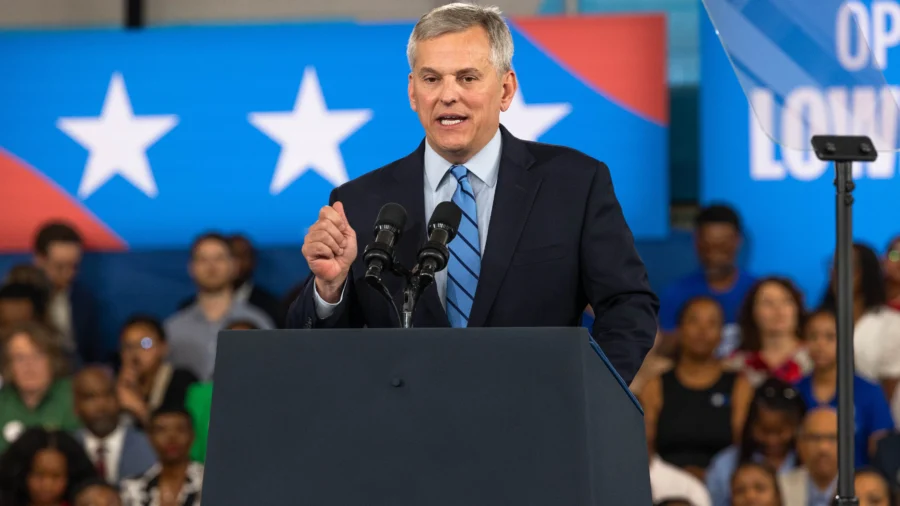RALEIGH, N.C.—Democrats fell short again in wresting away swing-state prize North Carolina from Republicans in the presidential election, but scored significant downballot victories, giving them hope as they look to the future.
Despite Donald Trump’s more than 3-percentage point win over Vice President Kamala Harris in North Carolina, Democrats celebrated Election Day victories in races for governor, attorney general, and the legislature in a closely divided state where conservatives have recently dominated the General Assembly and the courts.
In an election with few bright spots for Democrats nationally, the ticket-splitting tendencies of Tar Heel state voters offered some of that good news.
Attorney General Josh Stein, a Democrat, easily defeated Republican Lt. Gov. Mark Robinson to succeed Gov. Roy Cooper, who was ineligible to run again because of term limits.
Democrats have now won eight of the past nine gubernatorial elections in North Carolina. In contrast, Republicans have won the state in 11 of the 12 past presidential elections, with Barack Obama in 2008 the lone exception.
In the race to succeed Stein as attorney general, U.S. Rep. Jeff Jackson extended a Democratic election winning streak from 1900 by defeating U.S. Rep. Dan Bishop. Democrats flipped both the lieutenant governor’s office and the state school superintendent’s job.
State Democratic Party Chair Anderson Clayton, the youngest in the country at 26, is learning to embrace the positives while coping with the headwinds Harris faced at the top of the ticket.
“Everybody keeps calling us a bright spot,” she said. “And I’m like, ‘We still lost the presidential race.’”
State Republicans can hang their hats for 2024 success on Trump’s third consecutive electoral victory and the pickup of three additional congressional seats—the result of 2023 redistricting that led Democratic incumbents not to seek reelection. Those flips were key to national Republicans’ efforts to maintain U.S. House control.
But in the state’s lone toss-up congressional race, first-term Democratic Rep. Don Davis won narrowly. While the GOP retained a veto-proof majority in the state Senate, it will likely fall short of keeping one in the House by a single seat, giving Stein a more robust veto stamp to turn back Republican legislation.
Ticket-splitting in North Carolina has gone on for decades. Voters have long been comfortable with Democrats running state agencies but less at ease with the liberal wing of the national Democratic Party.
“People are unhappy and want to see change at the federal level. They’re not quite as comfortable with that idea of change for change’s sake at the state level,” said David McLennan, a political science professor at Meredith College in Raleigh.
State Republican leaders say their party still is doing well. They point to winning five of the 10 statewide executive branch positions, retaining General Assembly control and continuing recent dominance in statewide appellate court races. A pending state Supreme Court race, however, is heading to a recount.
“There’s going to be a lot of talk about North Carolina being a purple state. You’ve all heard me say this before: North Carolina is a default Republican state,” state Senate leader Phil Berger told reporters after the election.
The next major electoral test comes in 2026, when GOP U.S. Sen. Thom Tillis’ seat is up for reelection. Robinson hasn’t ruled out a future bid, which could include challenging Tillis in a primary. Among Democrats, Cooper hasn’t publicly rejected a 2026 Senate bid, and outgoing U.S. Rep. Wiley Nickel, a Democrat, has said he was also considering one. Democrats haven’t won a U.S. Senate seat in North Carolina since 2008.
Still, McLennan said, Democrats gave themselves something to build on.
“Democrats have to feel pretty good,” he said. “But they’ve still got a lot of work to do for 2026 and 2028.”
Clayton, the Democratic chair, said the work starts now. That means recruiting candidates, starting with next year’s municipal races, making sure incumbents have the help they need, and checking in with people across the state to lay the groundwork for future elections.
“We got to get back to basics,” she said.

